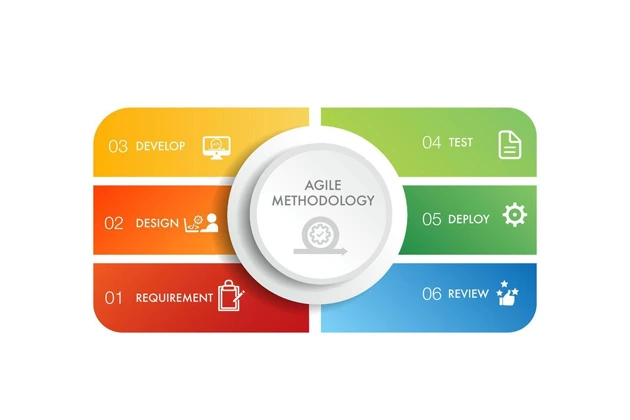Introduction
Organizations collapsing under inefficient systems, poor team communication, and lack of team coordination struggle to keep pace with the ever-evolving business world. As one of the widely adopted project management methodologies, agile methodology has gone a long way to evolve into an effective project management tool. The evolutionary and flexible approach of this project management methodology makes it a popular choice for project managers. Read ahead to discover what are some of the benefits of the agile development methodology.
Unraveling Agile Methodology
With a group of seventeen software developers, agile methodology came into play in 20001. Jeff Sutherland, Ken Schwaber, Jim Highsmith, John Kern, and other software developers have been working on conceptualizing and designing a methodology that could speed up the software development process in 2000. Their collaborative efforts in crafting a robust solution to deal with development issues gave birth to ‘the Agile Manifesto for Software Development,’ marking a watershed in the history of Agile. Since then, agile methodology has pushed its boundaries and evolved from a software development methodology into a project management methodology.
Moving beyond development, Agile witnessed success as Agile Testing in 2017. This testing approach accelerated product development by prioritizing the delivery of quality products and preventing defects in them. Agile development soon evolved into a methodology of project management, gaining immense popularity across industries.
As an iterative approach, agile methodology helps teams cope with the growing demands of businesses and workplaces. As an amalgamation of different methodologies, agile keeps the foundation for flexibility, quality, transparency, and continuous improvement in project management. Statistics from 2018 reveal that 91% of organizational respondents indicated the adoption of agile methodology by their organizations, marking its rapid adaptation by businesses. In order to unfold the reason behind such rapid adoption, an insight into the benefits of agile methodology is required.
What Are Some of The Benefits of The Agile Development Methodology?
Agile development methodology is unique in its approach to ensuring quality and value to customers by completing projects within the stipulated time frame. Let us explore how agile methodology opts for this uniqueness and serves various benefits-
1) Ensures Premium Quality
Agile project management involves agile testing in the project execution phase that tests the effectiveness of the final product prior to market launch. This not only ensures the delivery of premium quality products but also makes room for any improvements as per client preferences before launch.
2) Delivers Customer Value
With an enhanced quality in product delivery, agile methodology effectively delivers customer value as well. Agile’s benefits in driving customer value are not limited to quality product delivery only; it also involves customers in the decision-making process. By prioritizing customer feedback across all levels of project management, managers make changes in the process to deliver value.
3) Increases Visibility
Agile methodology promotes transparency and accountability by allowing team members and stakeholders to track the progress of projects. This visibility facilitates clear communication and helps develop a well-defined objective to ensure successful project delivery.
4) Improves Project Control
Agile ensures better control over projects. Its transparency, accountability, and feedback integration help control projects more effectively, allowing changes at each stage if required.
5) Eliminates Project Risks
With improved project control and client integration, potential risks are reduced. As agile works in small sprints, it allows continuous delivery of products. This approach helps keep a scope for making changes in the future if any approach fails.
6) Fosters Continuous Improvements
The Agile Manifesto holds the principle of continuous improvement by working in iteration. By making room for improvement at each step, this methodology makes each sprint better than the last one. Agility fosters a collaborative work culture, allowing team members to share ideas and improve through shared experiences.
7) Flexibility
A successful integration of agile methodology in a project infuses impeccable flexibility within the project team. All teams work in smaller sections and are improved by constant feedback from the product owner. Compared to other traditional project management methodologies, agile methodology conducts changes in no time. Divided sprints of a project become more flexible to manage effectively and implement changes within a short period.
8) A Well-Developed Team
A self-organized team is a well-developed team that has a sense of autonomy in the decision-making process. Agile projects generally have a cross-functional team that focuses on learning and growth by adopting new project management skills. With a small-scaled team, agile methodology offers the benefits of making a team with a flexible structure.
9) Effective Project Metrics
Traditional methodologies do not have as accurate metrics as agile methodologies do. Agile emphasizes performance optimization to produce effective results. Traditional methodologies like Waterfall focus solely on project completion within the estimated time and cost. Agile methodologies’ benefits go beyond project execution. It helps each stakeholder involved in a project to improve product quality and their own professional skills for future goals. It is a holistic approach that covers almost all aspects of project management.
10) Increases Adaptability
Agile methodology helps businesses adapt to change by breaking down projects and incorporating innovation. An empowered team in this methodology accepts and adapts to any change quite rapidly. The agile model allows embracing change to deliver better results through continuous improvements.
Conclusion
Summing up, it can be said that agile methodology provides numerous benefits in a project management lifecycle and beyond that. It helps build trust, foster innovation, embrace change with utmost flexibility, and improve project operations. This methodology is continually evolving, integrating changes in its approach with time. By aligning your business objectives with the project objectives, agile methodology enhances quality and customer satisfaction and reduces risks to make sure you remain a step ahead of the market competition.










